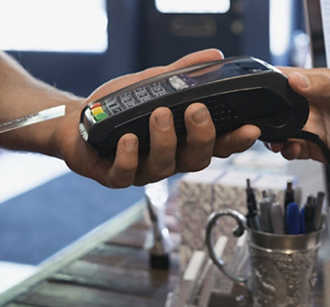
Card Payment Acceptance Tools & Technology
To accept credit and debit card payments, every business must first:
- Establish an account with a bank and a payment processing vendor
- Invest in payment acceptance, hardware, software, and service
Outlined below are the key products necessary to facilitate payments today.
Payment Terminal
The most basic method of card payment acceptance involves using a terminal tied directly to a cash register or Point-of-Sale (POS) system.
- Traditional terminals allow cards to be swiped and dipped. They often come with dedicated keypads for manual data entry
- Modern credit card readers connect wirelessly to a merchant’s POS system. Many of them come equipped with Near Field Communications (NFC) technology to allow mobile and contactless payments
Most payment terminal solutions also include built-in scanners and printers.
Point of Sale (POS) System
A POS system incorporates the requisite hardware and software to accept card payments. Some also include basic business management solutions all in one.
- Card readers
- Cash registers
- Cash drawers
- Barcode scanners
- Receipt printers
Some POS solutions come with basic business management software already installed. Depending on the platform, you may be able to customize your payment environment to meet your specific needs.
Mobile Payment Devices
Mobile Point-of-Sale (POS) solutions allow merchants to process credit card transactions on the go – whether customers wish to swipe, dip, or tap their plastic:
- With older mobile payment technology, merchants could turn their smartphones and tablets into credit card readers by inserting tiny attachments into the headphone jacks
- Modern mobile payment solutions connect wirelessly to POS systems, enabling order taking, inventory checking, and payment processing
Virtual Terminals
Merchants can use virtual terminals to process credit and debit card transactions from a desktop or laptop. Most virtual terminals are offered as software or web-based solutions that integrate with a Point-of-Sale (POS) system.
Virtual terminals are very useful if your customers routinely place orders by mail or phone.
Online Payment Tools
Customers can buy your products and services online if you set up either:
- Hosted payment pages to process credit or debit card transactions
- A payment gateway and shopping cart to accept card sales
Many end-to-end eCommerce platforms also allow you to create and manage your online store entirely from a single dashboard.
Card Payment Charges: The Cost of Doing Business
Working together, banks, processors, and card networks help merchants provide their consumers with seamless and secure payment experiences.
To cover these costs, merchants must pay card fees for every transaction. These charges are then distributed appropriately to the:
- Banks
- Payment processors
- Card networks
The Two Types of Card Payment Fees
Below are the two most popular types of payment transaction charges that merchants must pay when accepting credit cards.
Interchange Fees
Interchange card payment fees are what the cardholder’s bank (“issuing bank”) charges the merchant’s bank (“acquiring bank”) when processing card transactions.
Established by the card brands, this fee is automatically deducted from the total sales amount, and includes both:
- A flat “fixed” card payment transaction fee (e.g., $0.10)
- A “variable” fee based on a percentage of the total sale (including taxes)
The acquiring bank pays the issuing bank the total interchange fee. However, the exact size of these card payment charges can vary, depending on:
- The card network being used
- The card type (e.g., credit, debit, rewards, gift, etc.)
- How the payment is made (e.g., in-person, online, via phone, etc.)
- The industry and size of the business
- The region or country where the purchase takes place
The processor and the card network may apply additional card payment charges on top of the interchange fee.
Interchange Fee Example:
$100 sale at an apparel retailer*
| Payment Method | Fee Charged | Fee Base |
| Credit Card | $2.10 | 10¢ levy + $2.00 fee (2% of total sale) |
| Debit Card | .95 | 15¢ levy + .80 fee (.08% of total sale) |
| Pre-paid Debit/Gift Card | $1.30 | 15¢ levy + $1.15 fee (1.15% of total sale) |
*Example shows estimated card payment fees based on simplified 2018 rates. Additional factors may impact these charges.
Discount Fees
Many acquiring banks tack on additional card payment charges to cover:
- Their own processing services
- Payment-brand assessments
- Network access fees
Banks often use different card payment fee structures, with variable, bundled, and flat rate options being the most popular. This allows you to choose the most appropriate fee schedule for your specific needs.
Card Payment Fees and Federal Regulations
In 2010, Congress added the Durbin Amendment to the Dodd-Frank Wall Street Reform and Consumer Protection Act to help resolve an ongoing dispute between major banks and merchants over debit card processing fees.1
The amendment took power away from the banks by setting limits on the debit card payment fees that banks could charge merchants.
The key goal was to regulate card payment charges as a way to help merchants reduce costs and, in turn, offer lower prices to consumers.
The amendment has effectively saved many merchants money. Yet those who regularly process debit transactions under $10 have seen costs rise since the card payment fees charged no longer vary based on the transaction amount.
In addition, consumers didn’t necessarily benefit from this amendment, because:
- Merchants didn’t always lower their prices as intended
- Many banks started charging consumers higher fees
- Other banks reduced perks to make up for lost revenue
Source
1 “Durbin Amendment,” Investopedia





